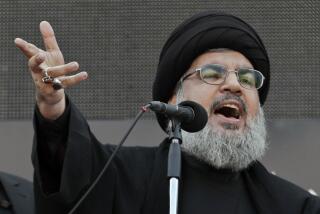Kadafi: Erratic, Feared Leader : Libyan Strongman Pursues Policies of Opposite Extremes
- Share via
WASHINGTON — In the two decades since he overthrew the Libyan monarchy in a bloodless coup, Col. Moammar Kadafi has gained a reputation as the Middle East’s most feared and unstable leader. Even his allies refer to the Libyan strongman as “mercurial.”
The son of a Bedouin shepherd who lived in Libya’s oil-rich desert, Kadafi has embraced domestic and foreign policies of opposite extremes.
He has called frequently for elimination of Libyan opposition outside the country, backing up his threat by dispatching death squads to Europe to assassinate opponents. Once, in the early 1980s, he ordered the trial of 500 dissidents to be televised nationally.
Last year he personally drove a bulldozer into a local prison to tear down the walls in an attempt to prove his promise to free political prisoners.
In foreign affairs, he has gone as far as to invite various U.S. secretaries of state to visit Tripoli--only months later to issue new threats against American targets. He is regarded by the Reagan Administration as a sponsor of state-supported terrorism.
Kadafi’s personal eccentricities are evident even in his choice of offices. In the heart of the Azzizia military barracks in downtown Tripoli, he has often held court in a tent with a sisal roof decorated with quilted blankets on the side and Oriental carpets on the floor. Cushions around the three enclosed sides provide the only furniture.
It is an anomaly in the otherwise modern and sprawling tank-protected barracks. Camels usually graze incongruously nearby.
Obsessed With Security
Kadafi has been obsessed with personal security, especially in the aftermath of the 1986 U.S. air strike on Libya that killed the Libyan leader’s adopted stepdaughter. But in another seeming incongruity, he is often known to appear at evening demonstrations on an Arab stallion and likes to race up and down in front of cheering crowds.
His revolutionary ideology, enshrined in his three volumes of the “Little Green Book,” is equally eccentric. In 1973, he pronounced his “Third International Theory” as “an alternative to capitalist materialism and communist atheism.”
It basically represented a combination of Islamic fundamentalism and Third World socialism.
As put into practice, revolutionary committees were established at all levels of local and national government. The masses were mobilized into a People’s Army, and even foreign embassies were renamed “People’s Bureaus.”
Libya’s vast oil wealth, which created a boom in a country with a population of only 3 million, has helped keep him in power. The per-capita income soared from $2,000 in 1970 to almost $10,000 in 1980, according to European diplomats who have maintained relations with Tripoli.
Despite the emphasis on Third World socialism, Kadafi was not averse to importing the finest-quality goods for the new state department stores that replaced the colorful old network of souqs and bazaar stalls.
Indeed, in 1981 he personally opened a new store that carried French perfumes and tuxedo shirts, German appliances, Japanese electronics, English toiletries and toys, even Danish cookies. The ceremony was broadcast live on Libyan television.
He also imported a half million workers to run new industries and construct high-rise apartments, office buildings, schools and clinics. Although once among the poorest nations in the world, the scruffy skylines of Tripoli and Benghazi began to look modern.
But the plummeting price of oil in the early 1980s cramped Kadafi’s style--and forced many cutbacks. Oil revenues dropped from about $20 billion in 1981 to roughly $9 billion in 1986.
By 1986, the department stores were scenes of shoving matches among Libyans for boxes of locally produced soap powder.
Recently, however, Libya began enjoying a business boom once again as the nation underwent a transformation as the result of a wave of economic changes instituted by Kadafi since May. These changes included opening up the flow of imports from neighboring states and making the black market an official “people’s market.”
Kadafi’s foreign policy also has been erratic. At a time he reportedly has been making secret overtures to the United States through intermediaries, he also said publicly: “We, as well as the fish, are awaiting them,” a reference to U.S. warplanes.
American analysts suggest that his three confrontations with the United States since 1981 actually have helped keep him in power. At times when he has been facing pressures at home, the incidents have elicited nationalist support.
That may have happened again Wednesday, when reporters who flew into Tripoli reported being taken to anti-American demonstrations.
More to Read
Sign up for Essential California
The most important California stories and recommendations in your inbox every morning.
You may occasionally receive promotional content from the Los Angeles Times.










